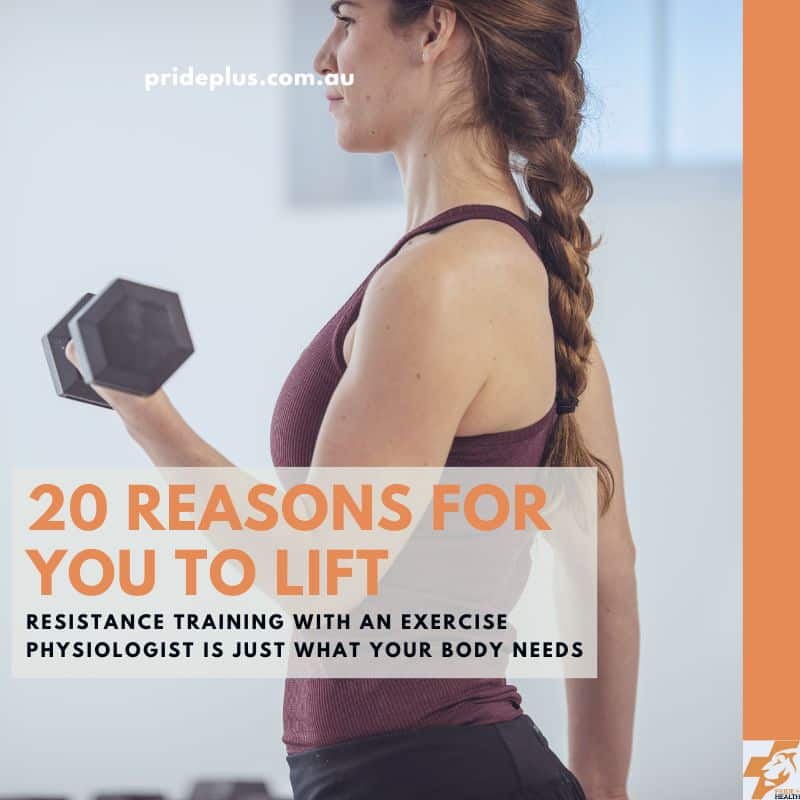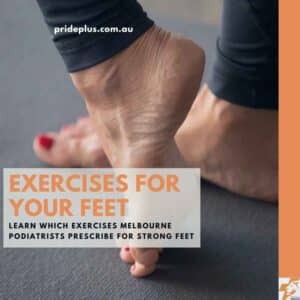Can I let you in on a secret about resistance training?
Well, actually 20 secrets about resistance training? These 20 reasons why resistance training with an EP (Exercise Physiologist) are just what your body needs really shouldn’t be a secret, but for some reason we don’t hear enough about them!
I don’t know who out there is responsible for hiding this information away in stuffy educational journals full of peer reviewed tutt-tutting, but it’s time to lift the lid on what we Exercise Physiologists do every day.
We help people feel better, and one of our most important tools is strength training.
20 Benefits of Resistance Training
- Increases muscle mass
- Decreases anxiety
- Increases bone mineral density (and prevents bone loss)
- Decreases risk of dementia
- Improves focus
- Decreases cholesterol
- Improves cognitive function
- Decreases blood pressure
- Improves feelings of well-being
- Decreases arthritic pain
- Improves balance
- Reduces depressive symptoms
- Increases walking speed
- Increases self-esteem
- Reduces chronic lower back pain
- Improves insulin-swings for those with type 2 diabetes
- Reduces markers of inflammation (particularly in people who are overweight)
- Improves insulin-sensitivity
- Reverses ageing factors in mitochondria and muscles
- Helps in managing fibromyalgia
Would you like to find out the how we can help you implement strength training? Take this short ( less than 2 minute ) quiz to find just how you can start weight training safely.
Resistance Training, Weight Training, Strength Training
So what is this magical exercise known as resistance training, weight training or strength training?
Lifting weights, be it body weight or the heaviest barbells are all a form of resistance training. You can do weight training where your body is exhausted, sweat dripping from every pore. You can also do resistance training and barely raise your heart rate (unlike cardio exercises).
We love resistance training as it not only gives you those 20 benefits we mentioned above, but it’s highly adaptable to your needs and abilities.
If you’re looking to increase muscle mass or reduce your risk of dementia you’ll perform different variations of resistance training. And that is where your Exercise Physiologist comes in.
It’s our role to not only know exactly what type or weight training you need to achieve your goals, but to set a plan for you to achieve them
How Much Resistance Training Do You Need
While the specific kinds of strength training varies person to person. The volume of resistance training that is recommended to us all is pretty consistent.
Every week adults need to lift, pull, push and train our way through 2 sessions of resistance training to maintain our health as we age.
There are some exceptions to this but think of it as the exercise version of the much maligned food pyramid. Your weekly recommended intake of exercise is 30 minutes of cardio every day, and 2 sessions of lifting per week.
If you’re not reaching that you’re not alone! Only 15% of Australian adults get enough exercise according to the National Health Survey. Crikey. It’s no wonder then that the opposite to that list of the 20 benefits of resistance training is occurring. An even more staggering statistic is that of 168 countries, we are ranked in the 97th percentile for resistance training.
Yes – almost everyone else is lifting more than us and reaping the rewards.
What Can You Do
The simple answer is start training. But it’s never that simple is it?
First you need to find your reason why. Are you going to start resistance training because you have diabetes and you must get your sugars back under control to reduce the chance of losing your feet?
Maybe you’re sick of feeling flat and looking for a boost in confidence and self esteem.
Or it’s pain that drives your need to start lifting safely.
(Or could it be your patriotic duty to bring Australia up the list of countries who actively weight train?)
Read over that list of 20 benefits and choose the one or two that are most important to you. Now think of what you’ll be like in 3 months time after you’ve started training?
How do you feel? How do you look? Is that starting to form the carrot of a goal you’ll work towards?
Another thought exercise is to do the same thing but reflect on what happens if you don’t start training?
- Are you happy?
- What does missing out on achieving that goal mean to you?
- Any regrets?
These thought experiments can be useful to spur yourself into action. Now you know why you want to start resistance training – you just have to start.
And that is where your exercise physiologist comes in.
Train With Your EP
As your exercise physiologist we’ll get you started on your journey to your goals safely and set you up for success.
We’ll prescribe your exercises and train you so that you feel comfortable and confident as you lift, push and pull. We’ll adjust when things are too hard as life throws curveballs our way. We’ll push you too when you’re ready to take the next step.
And we’ll help you be accountable to your goals so you achieve them.
Sounds good?
Start your resistance training with your Exercise Physiologist in Pascoe Vale today.
About the Author

Pascoe Vale Exercise Physiologist Aidan Rogers thrives on helping his clients lift themselves up towards their goals. First time lifters as well as those who are experienced in resistance training but need guidance getting back safely or overcoming a plateau will find his sessions valuable.
When not supporting his clients in Pascoe Vale, Aidan can be found hitting bombs on the golf course putting his weight training to good use.




